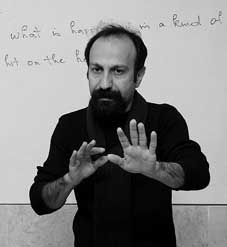|
Interview with Asghar Farhadi, director of "Nader and Simin: A Separation"
Bitter Truth, Sweet Expediency and Incomplete Salvation
by Massoud Mehrabi
|
 From production of his memorable TV series, Tale of a City, to his latest film, Nader and Simin: A Separation, Asghar Farhadi has progressed step by step and is now standing at the top of the world cinema. His name is now mentioned along with those of Wong Kar Wai, Francois Ozon, Fatih Akm, Alejandro Gonzalez Inarritu, Darren Aronofsky, Andrei Zviagintsev, Aleksandr Sokurov and other directors whose works have deeply touched the world cinema. From production of his memorable TV series, Tale of a City, to his latest film, Nader and Simin: A Separation, Asghar Farhadi has progressed step by step and is now standing at the top of the world cinema. His name is now mentioned along with those of Wong Kar Wai, Francois Ozon, Fatih Akm, Alejandro Gonzalez Inarritu, Darren Aronofsky, Andrei Zviagintsev, Aleksandr Sokurov and other directors whose works have deeply touched the world cinema.
Out of thousands of films made annually across the world, only tens are prominent and historical events (even when a single scene creates a sublime feeling in the audience). Nader and Simin: A Separation is one of them; a sublime movie excelling Farhadi’s past films, Fireworks Wednesday and About Elli. Here, the viewer is not identifying themselves, but are deeply involved in the story. This is why they become one with the film and do not let go up to the last minute.
This interview was carried out after Farhadi was back from Berlin Film Festival (2011). It will take a lot of time and effort to thoroughly discuss this valuable film. Therefore, we asked simple questions about how the idea was born. We focused on techniques used by a creative artist, how he works with tools and how one manages to put small gems together and produce a big, brilliant jewel like Nader and Simin: A Separation.
Before talking about the film, tell us about Berlin Film Festival and its fringe events some of which cannot be controlled either by you, or other Iranian filmmakers who find themselves in a similar condition.
I thought fringe events of the festival would be more prominent than 2009, when I took About Elli there. Due to this year’s conditions, I had prepared myself to talk more about the situation in Iran than the film. However, something happened during the first screening that riveted all attention on the film. Next morning, critiques appeared in print media and led to more discussion about the film than other matters. There is high curiosity about the Iranian society in various festivals which we should address when talking about the film. I was ready to give them worthwhile answers without marginalizing the film and causing it to be judged from a non-cinema standpoint. I believe that, as a filmmaker, I have no right to blame the audience for problems I face when making a film. This is my career. Nobody had forced me to make films. Therefore, I do not like to talk about problems and difficulties with viewers before then see my films. The film will help me to push such issues to the sidelines and focus more on the film. However, every reporter was sure to ask a question about the situation in Iran and filmmaking conditions in addition to questions they asked about the film...
...SUBSCRIBE
[Page: 108]
|
|
|
|
|
President & Publisher
Massoud Mehrabi
Editors:
Sohrab Soori
Translators:
Sohrab Soori
Vazrik Der-Sahakian
Behrouz Tourani
Zohreh Khatibi
Contributors
Mehrzad Danesh
Advertisements
Mohammad Mohammadian
Art Director
Babak Kassiri
Ad Designers
Amir Kheirandish
Hossein Kheirandish
Cover Design
Alireza Amakchi
Correspondents
E.Emrani & M. Behraznia (Germany)
Mohammad Haghighat (France)
A. Movahed & M. Amini (Italy)
Robert Richter (Switzerland)
F. Shafaghi (Canada)
B. Pakzad (UAE)
H. Rasti (Japan)
Print Supervisors
Shad-Rang
Noghreh-Abi
Gol-Naghsh
Subscription & Advertising Sales
Address: 10, Sam St., Hafez Ave., TEHRAN, IRAN
Phone: +98 21 66722444
Fax: +98 21 66718871
info@film-magazine.com
Copyright: Film International
© All rights reserved,
2023, Film International
Quarterly Magazine (ISSN 1021-6510)
Editorial Office: 5th Floor, No. 10
Sam St., Hafez Ave., Tehran 11389, Iran
Printed in Tehran
Publishing Date Summer 2011
*
All articles represent views of their
authors and not necessarily
those of the editors
|
|
|

